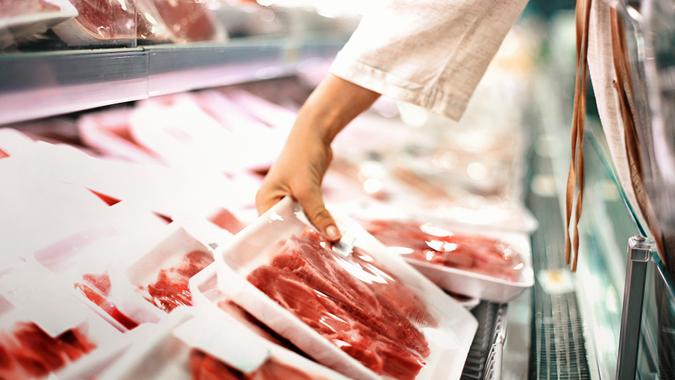
gilaxia / Getty Images/iStockphoto
Beef — it’s what’s for dinner. If you can afford it. The price of meat has skyrocketed in recent years, beyond the already high 9.1% inflation rate.
Learn: SNAP Updates To Know for Summer 2022
Find: Fed Raises Interest Rates 75 Basis Points Again in July – What Does The Increase Mean for You?
According to Vox, animal products including milk, eggs and meat have seen some of the highest surges, with beef increasing by nearly 15% from April 2021 to April 2022. The American Farm Bureau Federation put those estimates even higher, reporting that people looking to buy meat for summer barbecues can expect a 17% price hike this year. And that’s a big pressure on many, as 2019 USDA data showed individuals consume roughly 55 pounds of beef annually.
The increases, and their impact on American families, forced the Biden Administration to act. In early January, the White House announced the Biden-Harris Administration’s Action Plan for a Fairer, More Competitive, and More Resilient Meat and Poultry Supply Chain. The idea was to make the marketplace more competitive and bring more affordable prices to consumers through four key strategies.
One of the main issues, according to the action plan, is an apparent monopoly in the market, as four meat-packing companies control 85% of production and outsourcing. Those companies buy from farmers and sell to grocery stores, and the middleman process has put a “bottleneck” in the system. It has been affecting the bottom line of consumers and farmers alike, while corporate profits soar. To combat this, Biden’s administration allocated $1 billion to help expand independent processors.
There have been other factors contributing to the rise in the price of beef, as well. This week, the Texas Farm Bureau reported on the drought that is affecting their livestock, which makes up a substantial portion of sourcing. Not being able to grow feed and hay has meant a reduced capacity in herds, and has forced many farmers to sell off cows in numbers not seen since a similar drought in 2011.
Eat This, Not That! reported droughts have also been affecting Midwest farmers — no rain means less stable grass for cows to feed on. Coupled with the increased cost of gasoline, it’s affected the supply chain via higher costs to transport goods.
There’s also the issue of price gouging, with consumer advocacy groups alleging that major meat producers are adjusting price tags for their own record profits. In the case of Tyson (with chicken also seeing increases), Claire Kelloway of the Open Markets Institute told Vox the company has $2 billion in price increases, compared to the $1.5 billion in increased costs. “That is a solid half a billion dollars that is not related to an increased cost of business. That’s purely an exercise of their market power and ability to charge more, and their profits really speak to that.”
The increases, as well as growing concern for the environment and animal welfare, have prompted some people to start looking at meat alternatives. Plant-based food consumption is on the rise, with Bloomberg estimating that the market will be valued at $162 billion by 2030 (compared to $29.4 billion in 2020) and taking up a 7.7% share of the global protein market. With new products coming to market every day and carried by major retailers like Trader Joe’s and Kroger, supply is meeting the demand.
Consumer Price Index: 5 Things You Didn’t Know Were Impacted by Inflation
Explore: Surprising Things You Can Buy With Food Stamps
In fact, as GOBankingRates recently reported, 27% of Americans said they are cutting down on meat-based meals to lower their food costs, with vegetarian diets estimated to cost around $23 less per week.
More From GOBankingRates
from "price" - Google News https://ift.tt/WzTwtby
via IFTTT
No comments:
Post a Comment